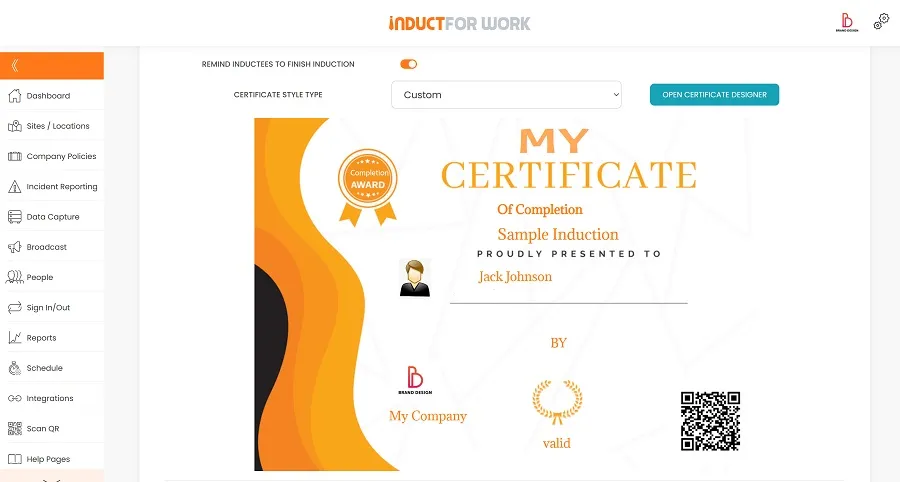
INTRODUCE WORKERS
TO YOUR SAFETY POLICIES
Induct all your employees and contractors to your Safety Policies and Procedures, Introduce workers to their responsibilities and what is expected of them.
CERTIFICATES OF
COMPLETION
When workers complete their introductory induction
they receive Certificate of Completion via email.


MONITOR COMPLIANCE
DOCUMENTS
Setup automatic colection and monitoring of compliance documents such licenses, insurances and other Certifications from all workers and contractors.
RELATED FEATURES
Send inductees invitations via SMS. This provides a layer of authentication so you know the person being inducted is the person that should be inducted!
Why Introductory Induction Training is Essential for All Workers in the UK.
When a new employee joins your business, how you welcome and introduce them can have a lasting impact. In the UK, where workplace safety, employee rights and compliance are closely monitored by agencies like the Health and Safety Executive (HSE), providing a structured induction training program isn’t just a nice-to-have—it’s a vital business function.
An introductory induction training helps new hires understand the company’s policies, expectations, safety procedures and culture from the start. It sets the tone for a successful working relationship and ensures your business operates within UK legal requirements.
1. Meeting Legal and Safety Requirements
Under UK law, all employers are required to provide adequate health and safety information and training to their workers. This is especially important during the early days of employment, when new hires are unfamiliar with their surroundings and most vulnerable to workplace incidents.
A thorough introductory induction training ensures all employees:
Understand key safety procedures and protocols
Are aware of emergency exits, fire safety equipment and first aid contacts
Know how to report accidents or hazards
This is not only crucial for protecting staff but also helps businesses demonstrate compliance with legal obligations, reducing the risk of fines or enforcement action.
2. Faster Integration into the Workplace
Starting a new job can be overwhelming. Introductory Induction training acts as a bridge, helping employees quickly become familiar with:
The company’s structure and key contacts
Day-to-day procedures and workplace expectations
Tools, technology or systems used in their role
By providing clarity early on, you reduce confusion and allow employees to get up to speed faster—boosting productivity from day one.
3. Promoting a Positive Work Culture
First impressions matter. A well-delivered introductory induction shows that your business values professionalism, communication and employee wellbeing. It also gives you the chance to set behavioural expectations and introduce your organisational values.
For example, explaining your approach to teamwork, punctuality, data protection and respect in the workplace helps shape a cohesive culture and reduces potential issues down the line.
4. Reducing Staff Turnover
Employees who feel supported and well-informed are far more likely to stay with your company. A strong induction programme:
Boosts morale and confidence
Reduces anxiety and confusion
Encourages commitment from new hires
This ultimately saves money by lowering recruitment and training costs associated with high turnover rates.
5. Enhancing Consistency Across the Workforce
Running a structured introductory induction training ensures that every new employee receives the same core information, regardless of who delivers the training or which department they join. This is particularly useful for businesses with multiple locations or remote teams, where standardisation of training is key.
